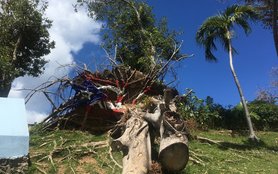Almost five years to the day after Hurricane Maria walloped Puerto Rico with high winds and rainfall, Hurricane Fiona hit the island. This storm dumped extraordinary amounts of water, causing devastating floods and mudslides, and knocking out the power grid once again.
Many of us in Puerto Rico were starting to finally see the light. After the devastation wreaked by Hurricanes Maria and Irma five years ago, we got stronger and more resilient. And after some ups and downs, we were even starting to feel like we took our community’s recovery into our own hands.
Even as the news crews left, and attention shifted away from Puerto Rico, those of us on the island pulled together to build a locally led, inclusive, green, and resilient destiny for ourselves and our children. Conversations started about climate-adaptive approaches, community-led recovery, and solar financing. There was so much momentum, vision, and--most of all--hope.
Then, five years almost to the day, Hurricane Fiona struck Puerto Rico, and took us back to some dark places--literally and figuratively.*
Hurricane Fiona delivered an extraordinary amount of water in a short time; the extreme rainfall reached up to 32 inches or more in some places. The devastating floods that followed are literally washing away some of our rebuilding efforts of the last five years. The power grid collapsed, throwing 1.4 million households into the dark.
In that darkness, many of us relived the trauma we felt last time around.
A hurricane exposes the veins of inequality and poverty that run deep through our communities. It is always the most vulnerable who are the hardest hit; and it is the most vulnerable who have the fewest resources to recover from the blow. The hurricane may pass over, but the devastation endures, and multiplies. Floods, blackouts, displacement, time out of school, land grabs, loss of loved ones and loss of community…
Disasters uncover the inequities--here in the United States and around the world--and their impact lasts for years.
Still, in spite of this fresh lashing by Hurricane Fiona, I believe in the resilience of the people of Puerto Rico.
Oxfam has partnered with wonderful partners on the ground, and they are already working to assess and address the urgent needs of our communities. Among them: Casa Pueblo, Observatory for Gender Equity, Bosque Modelo, Resilient Power Puerto Rico, and Coordinadora Paz para la Mujer.
From emergency access to electricity, to distributing solar lamps and clean water, they are working around the clock to help save lives, and then and get back on that path to recovery started in 2017.
Community and resilience have animated our tireless work in the last five years. And it will sustain us in the face of this new challenge, and in the face of climate hazards in years to come. We are seeing, firsthand, that extreme climate events have become the new norm. It’s on us to build back with more resilience, and more unity, to strengthen our communities so we can withstand what happens next.
Take action: Donate to Oxfam's emergency response fund today.
- Hurricane Maria struck Puerto Rico on September 20, 2017. In light of the massive structural damage to the island, and the wholly inadequate US federal government response, Oxfam mounted an emergency humanitarian response, which has grown into a program on the island.



